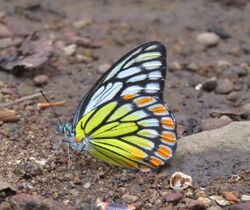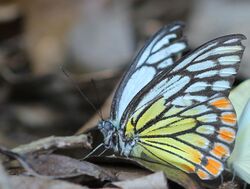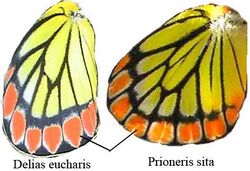Biology:Prioneris sita
| Painted sawtooth | |
|---|---|

| |
| Mud-puddling | |
| Scientific classification Error creating thumbnail: Unable to save thumbnail to destination
| |
| Domain: | Eukaryota |
| Kingdom: | Animalia |
| Phylum: | Arthropoda |
| Class: | Insecta |
| Order: | Lepidoptera |
| Family: | Pieridae |
| Genus: | Prioneris |
| Species: | P. sita
|
| Binomial name | |
| Prioneris sita C. Felder, 1865
| |
Prioneris sita, the painted sawtooth,[1][2] is a small butterfly of the family Pieridae, that is, the yellows and whites, which is found in south India and Sri Lanka.[1][2]
Description

.
Upperside: White with a slight greenish tint. Forewings and hindwings: The markings of the underside faintly visible through the wing.[3]
Underside: Forewing: White, costa black and the apex suffuse with yellow. Hindwing: Rich chrome yellow up to a postdiscal band. Beyond this the ground color is white with a series of large terminal vermillion-red spots. These spots are rectangular or truncated cone shaped.[3]
The antennae is brownish black. Head and thorax are covered with long bluish-grey hairs. The abdomen is greyish white.[3]
Wingspan: 86–90 mm (3.40-3.55 in).[3][4]
Mimicry
The painted sawtooth is a Batesian mimic of Delias eucharis, the common Jezebel, which has a much greater range, covering the entire Indian peninsula. Prioneris sita is only found in a small stretch of the Western Ghats, ranging from West-Central Karnataka, to the Nilgiris and Wayanad, south to Nilambur. It is a rare visitor to Travancore. The two can be told apart from the shape of the hindwing. The painted sawtooth has a much broader hindwing. The orange-red spots on the margin of the hindwing, in the painted sawtooth, are more squarish in shape whereas in the common Jezebel they are arrowhead shaped. The painted sawtooth also flies faster and inhabits dense forests. Unlike the common Jezebel it can also be found mud-puddling.
Life cycle
Larva: Dull blue green. The head and all the segments are dotted with minute blue tubercles, those on the head and sides are black tipped. Dorsal surface pubescent with a lateral fringe of soft white hairs below the spiracles.[3]
Pupa: Bright green in color. Sharply pointed at the head, with two strong lateral points and keeled on the dorsal surface of the thoracic segments. There is an interrupted yellow dorsal line, and a short curved crimson line on each side below the thoracic segments bordering a small white irregular black speckled spot.[3]
See also
- List of butterflies of India
- List of butterflies of India (Pieridae)
Notes
- ↑ 1.0 1.1 Varshney, R.K.; Smetacek, Peter (2015). A Synoptic Catalogue of the Butterflies of India. New Delhi: Butterfly Research Centre, Bhimtal & Indinov Publishing, New Delhi. pp. 79. doi:10.13140/RG.2.1.3966.2164. ISBN 978-81-929826-4-9. https://www.researchgate.net/publication/287980260.
- ↑ 2.0 2.1 Savela, Markku. "Prioneris sita (C. & R. Felder, [1865)"]. http://www.nic.funet.fi/pub/sci/bio/life/insecta/lepidoptera/ditrysia/papilionoidea/pieridae/pierinae/prioneris/#sita.
- ↑ 3.0 3.1 3.2 3.3 3.4 3.5
 This article incorporates text from a publication now in the public domain: Bingham, C.T. (1907). The Fauna of British India, Including Ceylon and Burma. II (1st ed.). London: Taylor and Francis, Ltd.. pp. 154. https://archive.org/stream/butterflies02bingiala#page/154/mode/2up/.
This article incorporates text from a publication now in the public domain: Bingham, C.T. (1907). The Fauna of British India, Including Ceylon and Burma. II (1st ed.). London: Taylor and Francis, Ltd.. pp. 154. https://archive.org/stream/butterflies02bingiala#page/154/mode/2up/.
- ↑ Moore, Frederic (1903–1905). Lepidoptera Indica. Vol. VI. London: Lovell Reeve and Co.. pp. 190–191. https://www.biodiversitylibrary.org/item/103503#page/202/mode/1up.
References
- Evans, W.H. (1932). The Identification of Indian Butterflies (2nd ed.). Mumbai, India: Bombay Natural History Society.
- Gaonkar, Harish (1996). Butterflies of the Western Ghats, India (including Sri Lanka) - A Biodiversity Assessment of a Threatened Mountain System. Bangalore, India: Centre for Ecological Sciences.
- Gay, Thomas; Kehimkar, Isaac David; Punetha, Jagdish Chandra (1992). Common Butterflies of India. Nature Guides. Bombay, India: World Wide Fund for Nature-India by Oxford University Press. ISBN 978-0195631647.
- Kunte, Krushnamegh (2000). Butterflies of Peninsular India. India, A Lifescape. Hyderabad, India: Universities Press. ISBN 978-8173713545. https://books.google.com/books?id=cuPPjOMcu_4C.
- Wynter-Blyth, Mark Alexander (1957). Butterflies of the Indian Region. Bombay, India: Bombay Natural History Society. ISBN 978-8170192329. https://books.google.com/books?id=yEkgAQAAMAAJ.
Wikidata ☰ Q1595726 entry
 |



